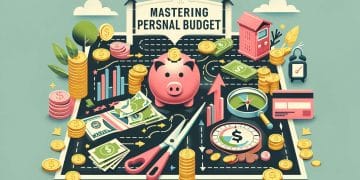Master Your Personal Budget: The Essential Guide to Financial Success

Anúncios

In an era where financial stability is paramount, mastering personal budgeting is no longer a luxury but a necessity. As individuals navigate an increasingly complex financial landscape, understanding how to effectively manage one’s finances has become imperative. Personal budgeting serves as a crucial pillar in achieving long-term financial success, allowing individuals to make informed decisions about their spending habits.
The concept of personal budgeting extends beyond simply tracking expenses; it involves strategic planning and goal setting. A well-structured budget provides a clear roadmap to achieving both short-term and long-term financial goals. By prioritizing expenditures and identifying areas to save, individuals can avoid common financial pitfalls and work towards their financial aspirations with confidence and clarity.
This article aims to explore personal budgeting comprehensively, examining the essential components that contribute to its effectiveness. By delving into income management, expenditure categorization, and financial goal-setting, readers will gain valuable insights into creating and maintaining a successful personal budget. Additionally, practical tips and strategies will be discussed to enhance financial resilience and ensure prosperity.
Understanding Personal Budgeting: A Comprehensive Overview
At its core, personal budgeting is about understanding your financial inflow and outflow. Begin by listing all sources of income, including steady income streams and any additional earnings such as freelance work. Once your income is comprehensively outlined, classify expenses into categories of necessity and preference. Regular expenses like rent and utilities must be distinguished from discretionary costs like dining out or entertainment.
Setting financial goals is crucial for successful budgeting. Clear objectives guide spending and saving decisions, whether at one’s immediate short-term desires or their long-term vision. Achieving highly specific goals will enhance financial discipline. To ensure success, break these down into smaller, manageable milestones to foster consistent progress, making the journey towards financial stability more attainable.
Finding a suitable budgeting method tailored to one’s lifestyle and financial circumstances is crucial. Popular approaches include the Zero-Based Budgeting method, where every dollar is purpose-assigned, leaving no room for unaccounted expenditures. Additionally, the 50/30/20 Rule offers a balanced allocation guide: 50% necessities, 30% discretionary, and 20% savings and debt management.
Establishing and maintaining a personal budget necessitates gathering all relevant financial documents, such as bank statements and pay stubs, to construct an accurate overview of the financial standing. This comprehensive data serves as the foundation for budget creation and ensures ongoing effective tracking of income and expenses. Budgeting applications and software facilitate easier monitoring of financial habits.
Common budgeting errors must be recognized and avoided to ensure success. Realistic expense estimation is critical to prevent budget shortfalls. Additionally, an emphasis on developing an emergency fund is essential for unexpected scenarios. Engaging all household members in budget discussions ensures collaborative effort towards shared financial goals, while allowing for discretionary spending maintains motivation.
The Essential Characteristics of Personal Budgeting
- Comprehensive understanding of income and expenses.
- Clear and achievable financial goals.
- Suitable budgeting method selection.
- Regular monitoring and adaptation of budget.
- Avoidance of common budgeting pitfalls.
The Benefits of Effective Personal Budgeting
Effective personal budgeting yields a plethora of benefits that significantly attribute to an individual’s financial health and well-being. One primary advantage is that it facilitates living within one’s means, thereby reducing dependence on credit and avoiding debt accumulation. This foundational control over one’s finances paves the way to building savings and financial security.
Another significant benefit of personal budgeting is the achievement of financial goals, both short-term and long-term. By strategically planning expenditure and allocating funds towards specific objectives, such as homeownership or retirement savings, individuals can systematically work towards realizing their financial dreams.
Personal budgeting also enhances clarity and reduces financial anxiety. It provides a sense of control over one’s financial life, which translates to reduced stress and greater peace of mind. Knowing where each dollar is going offers reassurance, allowing individuals to focus on other fulfilling life aspects.
Furthermore, budgeting fosters financial flexibility, offering a buffer for unexpected expenses and emergencies remains ready. By setting aside funds for unforeseen circumstances, individuals can handle financial surprises without derailing their long-term financial plans. This preparedness ensures stability even in challenging times.
Lastly, effective budgeting encourages mindful spending habits foster conscious consumption and thoughtful financial choices. Individuals become more aware of their financial landscapes, contributing to more responsible decisions and overall financial well-being. In turn, these refined habits support the gradual achievement of greater economic freedom and stability.
Personal budgeting equips individuals with the necessary tools to navigate complex financial terrains with confidence and foresight. By strategically managing income and expenses, individuals can pave a path to financial prosperity. Consistency and persistence in maintaining a budget are key to long-term success, ensuring financial goals are within reach.
- Promotes living within one’s means.
- Facilitates goal achievement.
- Enhances financial clarity and reduces anxiety.
- Provides financial flexibility and emergency preparedness.
- Encourages mindful spending habits.
Ultimately, mastering personal budgeting is not just about cutting expenses but empowering informed financial decisions. It lays the groundwork for a secure financial future, enabling individuals to pursue their ambitions while maintaining financial health. With dedication and strategic planning, anyone can master the art of budgeting and achieve the financial success they desire.





